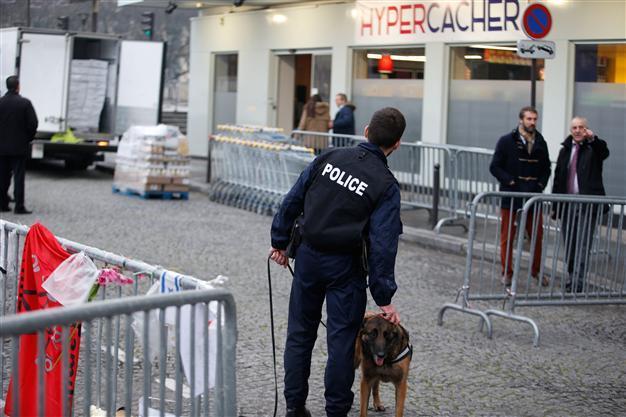France faces 'unprecedented' terror threat, say officials
PARIS - Agence France-Presse

This picture taken on March 15, 2015 shows a Police officer and his dog standing guard outside the Hyper Cacher Jewish supermarket in Paris that became the site of a bloody hostage drama during a jihadist attack in January. AFP Photo
The threat of a jihadist attack in France has reached a level "without precedent" and new attacks are inevitable, according to top counter-terrorism officials."The threat is permanent," said one high-level official in the defence ministry, speaking on condition of anonymity.
"Not one day goes by without an alert, the discovery of a network trying to send people to Syria or Iraq, or an intervention (by the security services).
"The number of targets has exploded. There are two or three thousand, maybe four thousand, people identified or suspected of evil intentions."
Nor are they all amateurs, the source added -- many are highly educated. "They are pros, not drop-outs," he said.
Defence ministry specialists say the jihadists "use the best encryption and concealment techniques" and that security services are "playing catch-up".
"Every time we get our hands on a network, we see they are each using seven or eight SIM cards, changing them constantly. And the most cunning don't go near phones at all -- they use messengers."
The biggest concerns relate to the estimated 200 individuals who have returned from training or fighting in areas held by the Islamic State of Iraq and the Levant (ISIL).
"They have lost all inhibitions about violence," said another top counter-terrorism official, also speaking on condition of anonymity.
Security services place them under the tightest possible surveillance, but resources are limited and the authorities are also painfully aware that militants may wait years before acting.
That was the case with the Kouachi brothers who carried out the attack on Charlie Hebdo satirical magazine in January.
They had long-standing links to jihadist networks in Paris, and one had travelled to Yemen for training back in 2011, but they had gradually fallen off the radar of security services after laying low for several years.
Officials also fear that competition between militant groups may drive them to ever-more brutal acts.
"Al-Qaeda needs to restore its prestige and will try to compete with ISIL with complex and major actions," said the official.
He highlighted the threat from an Al-Qaeda sub-group known as Khorasan, which is still thought to be planning a major airline attack.
One of Khorasan's key members is a French explosives expert, David Drugeon, who is thought to have survived an attempted assassination by a US drone strike last year.
That compares with the more conventional military threat posed by ISIL, the official said, "which is in the process of training commandos and sending them onto our territory with high-quality equipment".
Since the attacks in Paris in January that left 17 dead, France has been on the highest possible alert with thousands of police and troops deployed at sensitive sites, such as media headquarters and synagogues.
But counter-terrorism officials say this will do little to prevent an attack.
Unveiling new surveillance laws on Thursday, Prime Minister Manuel Valls said the jihadist threat was "constantly evolving," emanating as much from groups based abroad as from individuals present on French soil.
"The problem is not to know if there will be a new attack," said Valls. "It is to know when and where."
















